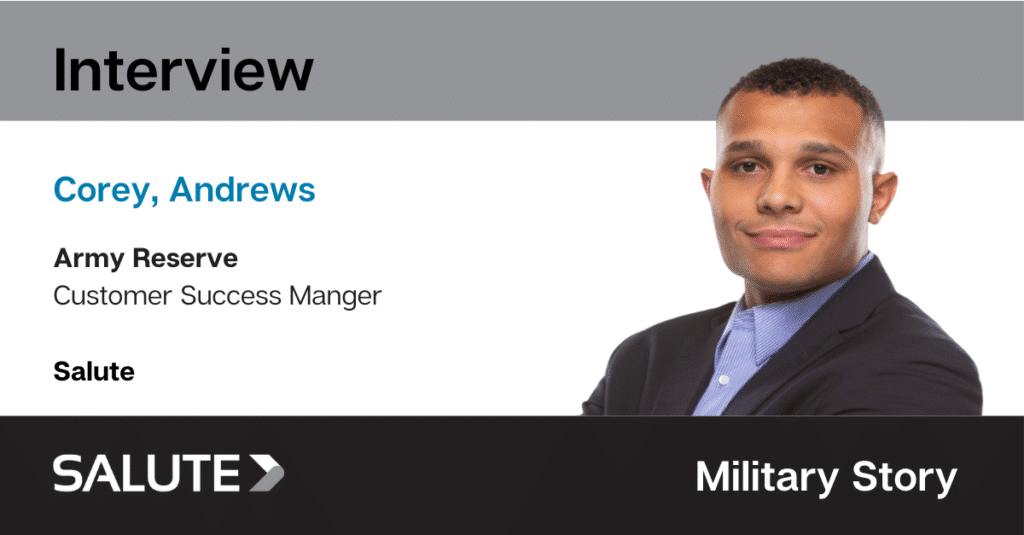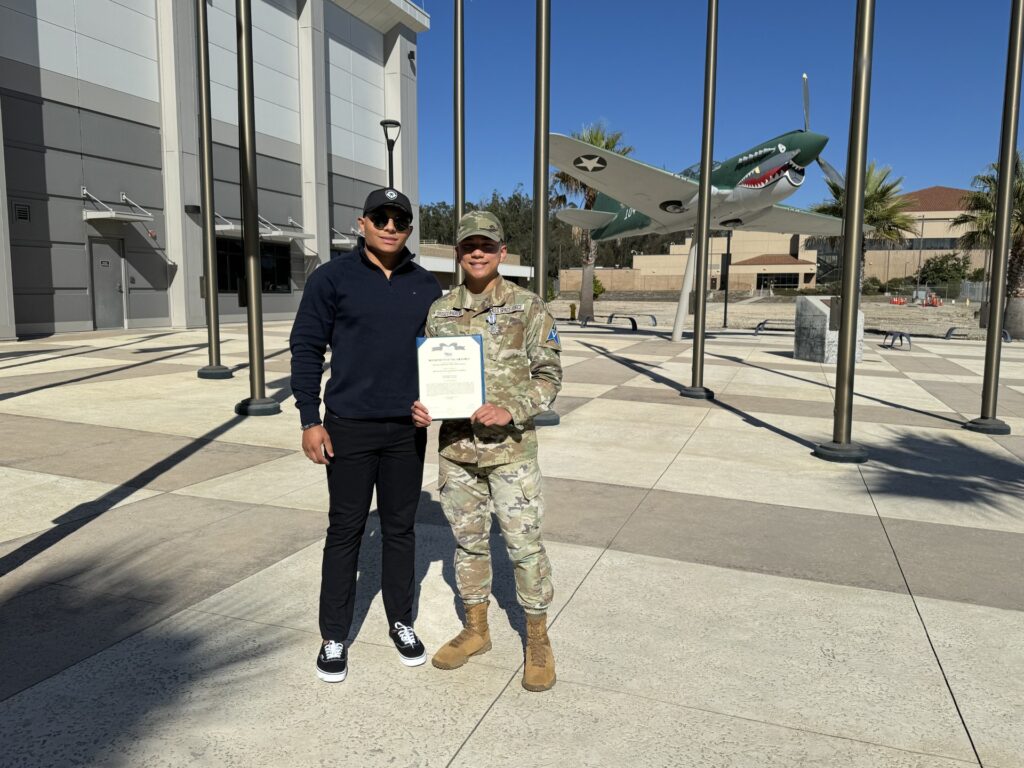Lee Kirby, Salute Co-Founder, and retired Army colonel interviewed Corey Andrews, Army Reserve and Customer Success Manager at Salute.

Before we dig in, our readers would love to get to know you a bit. Can you tell us a bit about your childhood “backstory”?
I grew up in the close-knit town of Oxford, Massachusetts, as one of six siblings. My early years were shaped by unwavering love, strong values, and resilience—instilled in me by two incredible women, my mother and my nana. My nana, a devoted Catholic, taught me the importance of kindness and integrity, always reminding us, “Treat others the way you would want to be treated.” My mother, a hardworking and selfless woman, made countless sacrifices to provide for us, ensuring we had stability and love despite life’s challenges.
Due to life challenges, my life changed significantly in middle school when my siblings and I were placed in the foster care system, a transition that brought uncertainty and hardship. Eventually, this journey led me to Hawaii, where my first cousin along with her husband and two children—a dedicated military family—welcomed my sister and me into their home. Their structured environment, discipline, and unwavering support introduced me to a new way of life, one that emphasized resilience, adaptability, and the power of community. Through these experiences, I learned that adversity isn’t a roadblock; it’s an opportunity for growth. My journey has shaped my values of perseverance, hard work, and kindness—lessons that continue to guide me both personally and professionally.
What are you doing today?
I joined Salute Mission Critical four months ago as a Customer Success Manager. Since then, I have been immersing myself in the data center industry—an exciting and enlightening experience that has deepened my understanding of its complexities. As a Customer Success Manager, my role revolves around delivering strategic support, optimizing operational efficiency, and driving measurable value for our clients. My key responsibilities include managing renewals, collaborating cross-functionally to streamline processes, coordinating quarterly and annual business reviews, and fostering long-term partnerships that drive customer success. Beyond my professional journey, the military remains a significant part of my personal life.
After meeting my now-husband in Hawaii, he joined the Space Force as a Cyber Defense Operator, which eventually brought us to California. We now call Vandenberg Space Force Base home, where we live with our two dogs, Bubu and Butters.
Can you tell us a bit about your military background?
Coming from a family with multiple service members, I always felt drawn to the military. Initially, I considered enlisting in active duty, but after graduation, I wasn’t quite ready to leave Hawaii. At the same time, I had developed a strong interest in business and sales and wanted to explore career opportunities in that field. To balance both aspirations, I decided to join the Army Reserves—allowing me to serve my country while pursuing my professional goals. I enlisted as an Interior Electrician and soon after began basic training at Fort Leonard Wood, Missouri. During my training, I gained hands-on experience working with electrical systems and infrastructure, which gave me a solid technical foundation. After completing my training, I returned to Hawaii and was stationed with my unit at Fort Shafter on Oahu, where I continued developing my technical and leadership skills. I separated from the Army Reserves shortly before relocating to California for my husband’s active-duty assignment in the Space Force.
Can you share an interesting experience from your military career? What lesson did you take from it?
Every year, our two-week Reserve training took us to a remote mountain site on the Big Island, where we set up camp on rugged dirt and lava rock. The weather was unpredictable, but one year, the nights were especially cold. That particular year, I was assigned fire watch in the middle of the night. The last thing I wanted to do was wake up at 3 a.m. to sit outside in the freezing cold, guarding weapons and trucks. But when I stepped out of my tent, I was met with a sight I’ll never forget. The sky stretched endlessly, filled with more stars than I had ever seen before. With only flashlights around, the stars shined brighter than I could have imagined. In that moment, the cold and exhaustion didn’t matter—I was completely in awe. That night taught me a powerful lesson: sometimes, the most extraordinary moments happen when we least expect them. What seemed miserable turned into a beautiful experience.
Did your military experience help prepare you for business and leadership? How?
Absolutely. My time in the military provided me with an unshakable foundation in discipline, adaptability, and resilience—qualities that have been invaluable in my career. The military teaches you how to perform under pressure, make decisions with limited information, and take responsibility in challenging situations. One of the most valuable lessons I learned was resilience. Whether enduring grueling training, working through exhaustion, or handling unexpected challenges, the ability to stay composed and support those around me became second nature. Another critical skill I developed was teamwork. Just like in business, success in the military relies on collaboration—no one succeeds alone. The ability to problem-solve, adapt, and work within a team has been crucial in my professional growth. My military experience taught me to approach challenges with confidence and a solution-oriented mindset, which continues to serve me well in my career today.
None of us are able to achieve success without some help along the way. Is there a particular person who you are grateful towards who helped get you to where you are? Can you share a story?
While I can’t attribute my success to just one person, I am deeply grateful for the collective support of many individuals who have guided and shaped me throughout my journey. From overcoming early challenges to navigating multiple industries, I have been fortunate to learn from mentors, colleagues, friends, and family who have each played a pivotal role in my growth. To this day, I turn to my trusted support system when making significant professional or personal decisions. I seek insights from those I respect, knowing that each brings a unique perspective. What makes this network invaluable is their ability to offer diverse viewpoints without imposing their own choices. Instead of steering me in a particular direction, they provide thoughtful guidance based on their experiences, equipping me with the knowledge to make well-informed decisions—always reinforcing their support, regardless of my choice. Having a strong, diverse network has been one of my greatest assets, reinforcing the importance of continuous learning, adaptability, and the power of community. I am grateful for the many voices that have helped shape my path, knowing that success is not achieved alone, but through the wisdom and support of those around us.
Why is “Veterans helping veterans” important?
The Salute Veterans Community represents support, mentorship, and shared purpose, ensuring veterans aren’t left to navigate their transition alone. Having seen many veterans struggle to find a clear path post-service, I know how critical a strong support system can be. Veterans bring discipline, adaptability, and leadership, but often need the right connections to break into new industries. By empowering them, we not only help individuals build meaningful careers but also strengthen industries with mission-driven professionals who bring excellence and commitment. Giving back to this community is both a responsibility and an honor. The military taught us to look out for one another, and that mission continues beyond service. By fostering opportunities and advocating for veterans, we ensure no one is left behind and every veteran has the opportunity to succeed.
If you could inspire a movement that would bring the most good to the most people, what would it be?
I would inspire a movement to mentor and empower young adults to take ownership of their careers early. Young adults are often told, ‘Enjoy your youth; there’s plenty of time to figure things out,’ but this mindset delays personal and professional growth. I began working at a very young age and gained real-world experience across multiple industries. Early exposure to the workforce instilled discipline, adaptability, and a strong work ethic—essential traits for long-term success. The sooner young people enter the workforce, the more confidence they gain in navigating their careers. Beyond career-building, I believe in instilling core military values—community, hard work, persistence, reliability, and self-motivation. These qualities produce dependable, goal-oriented individuals who are prepared to lead and overcome obstacles. Life moves fast. Waiting too long to plan a career can result in missed opportunities and unnecessary challenges. I’ve seen this firsthand in many individuals who put off planning their futures, only to struggle later. Instead, young adults should proactively shape their future, study successful individuals, and strategize their path forward. There is so much to achieve, explore, and contribute, but success requires intentional effort and preparation. My movement would encourage young people to take initiative, develop strong work ethics, and seek mentorship early, setting them up for success in whatever path they choose.
As a military spouse, what has been your biggest challenge and what lessons have you learned?
Becoming a military spouse has been a journey of constant adaptation. One of the biggest challenges was our first move to an active-duty station—leaving behind familiarity, adjusting to a new environment, and being far from family and friends. Over time, I’ve learned that distance changes relationships—communication fades, and some friendships naturally shift. Another challenge is the unpredictability of military life. My husband has had extended training periods, sometimes lasting up to five months. Even when he’s home, there’s always a possibility of a change of station, making it difficult to plan ahead—both personally and professionally. Through these experiences, I’ve realized that stability comes from within. Adapting, staying resilient, and embracing each challenge with confidence has been key.

How can our readers follow you online?
I’m active on LinkedIn!
